Imperial Hotel UK: Analyzing Leadership and Management Theories
VerifiedAdded on 2024/07/12
|12
|2802
|492
Case Study
AI Summary
This assignment focuses on the Imperial Hotel UK case study, addressing issues related to ineffective leadership and management. The analysis incorporates various leadership and management theories to understand the challenges faced by the hotel, including poor staff performance and reduced guest satisfaction. The new general manager's proposed solutions, such as leading by example, reviewing monitoring procedures, incentivizing supportive management, and devising cross-department collaboration, are examined. Alternative solutions, including leadership development programs and quality management software, are also suggested to improve employee motivation, performance, and overall organizational efficiency. The case study highlights the importance of effective leadership in achieving organizational success and provides insights into how to address leadership challenges in the hospitality industry. Desklib provides solved assignments and resources for students.
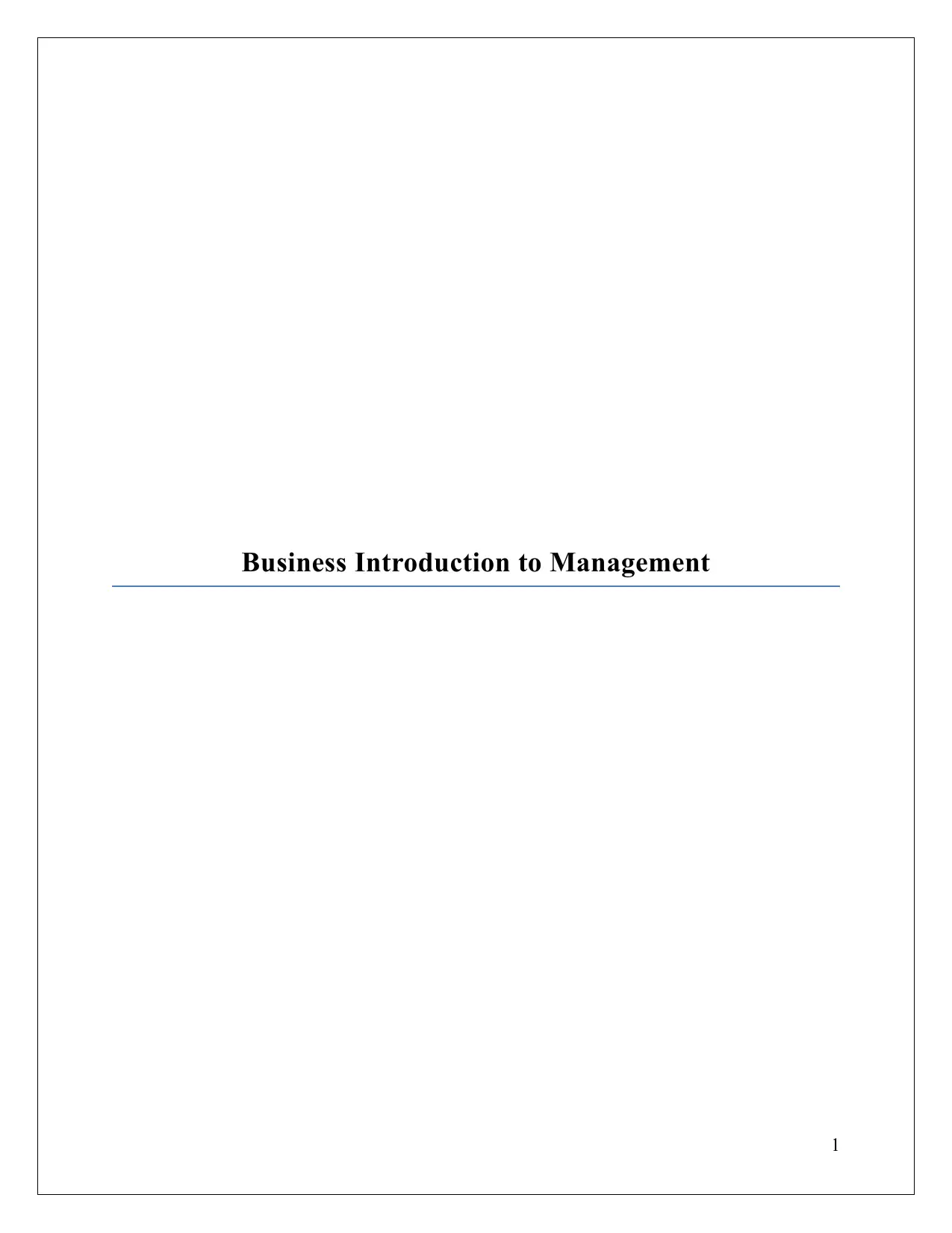
Business Introduction to Management
1
1
Paraphrase This Document
Need a fresh take? Get an instant paraphrase of this document with our AI Paraphraser
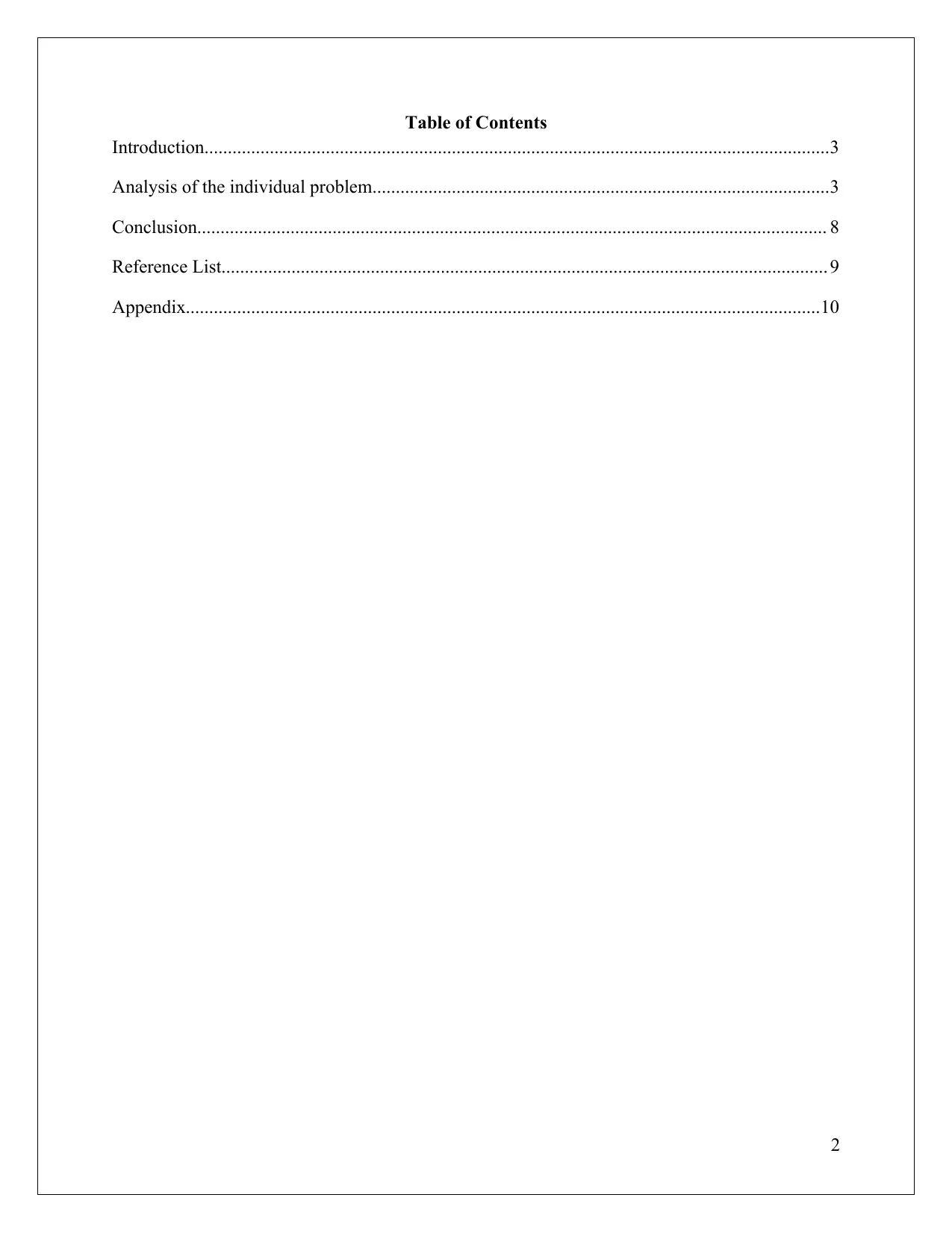
Table of Contents
Introduction......................................................................................................................................3
Analysis of the individual problem..................................................................................................3
Conclusion....................................................................................................................................... 8
Reference List.................................................................................................................................. 9
Appendix........................................................................................................................................10
2
Introduction......................................................................................................................................3
Analysis of the individual problem..................................................................................................3
Conclusion....................................................................................................................................... 8
Reference List.................................................................................................................................. 9
Appendix........................................................................................................................................10
2
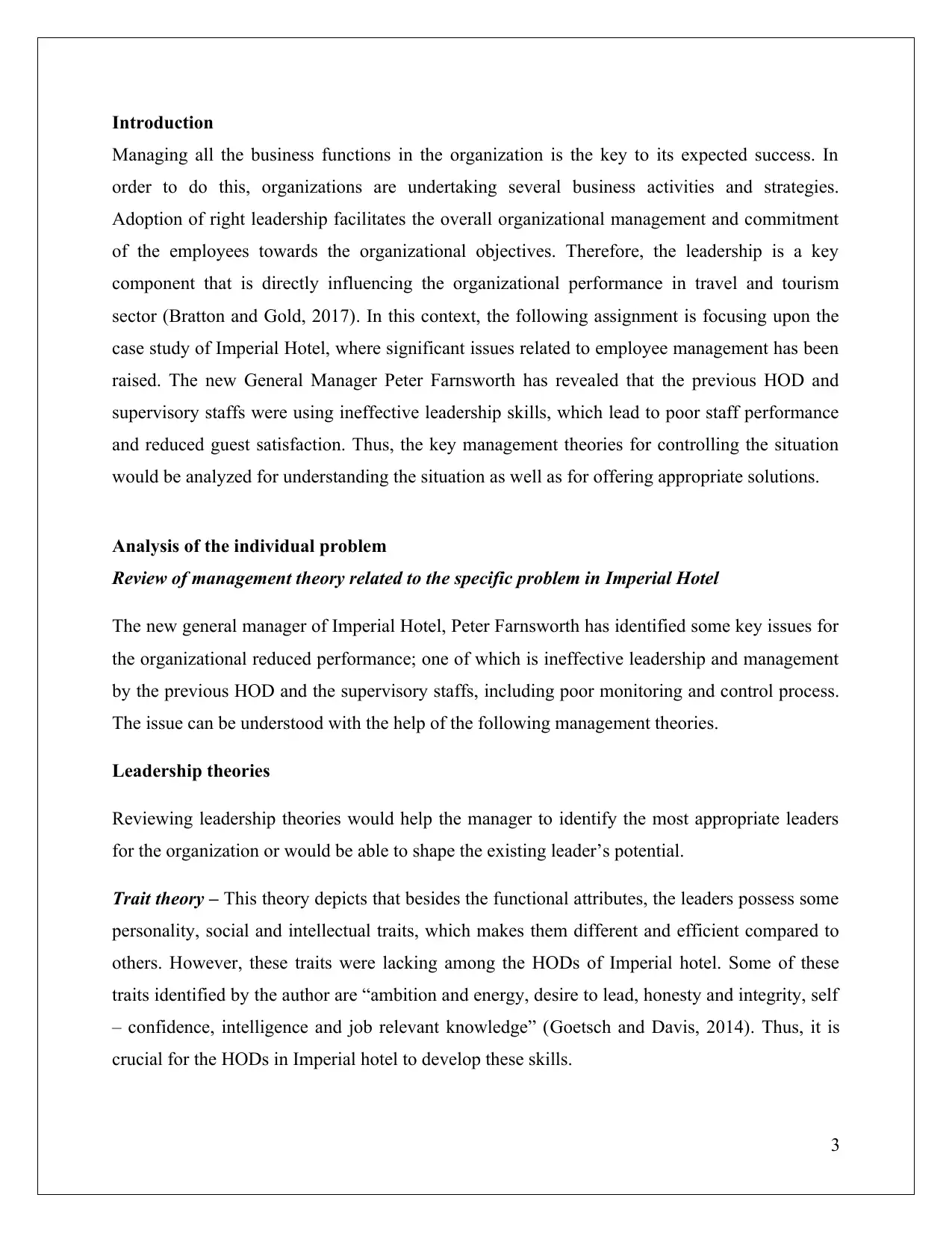
Introduction
Managing all the business functions in the organization is the key to its expected success. In
order to do this, organizations are undertaking several business activities and strategies.
Adoption of right leadership facilitates the overall organizational management and commitment
of the employees towards the organizational objectives. Therefore, the leadership is a key
component that is directly influencing the organizational performance in travel and tourism
sector (Bratton and Gold, 2017). In this context, the following assignment is focusing upon the
case study of Imperial Hotel, where significant issues related to employee management has been
raised. The new General Manager Peter Farnsworth has revealed that the previous HOD and
supervisory staffs were using ineffective leadership skills, which lead to poor staff performance
and reduced guest satisfaction. Thus, the key management theories for controlling the situation
would be analyzed for understanding the situation as well as for offering appropriate solutions.
Analysis of the individual problem
Review of management theory related to the specific problem in Imperial Hotel
The new general manager of Imperial Hotel, Peter Farnsworth has identified some key issues for
the organizational reduced performance; one of which is ineffective leadership and management
by the previous HOD and the supervisory staffs, including poor monitoring and control process.
The issue can be understood with the help of the following management theories.
Leadership theories
Reviewing leadership theories would help the manager to identify the most appropriate leaders
for the organization or would be able to shape the existing leader’s potential.
Trait theory – This theory depicts that besides the functional attributes, the leaders possess some
personality, social and intellectual traits, which makes them different and efficient compared to
others. However, these traits were lacking among the HODs of Imperial hotel. Some of these
traits identified by the author are “ambition and energy, desire to lead, honesty and integrity, self
– confidence, intelligence and job relevant knowledge” (Goetsch and Davis, 2014). Thus, it is
crucial for the HODs in Imperial hotel to develop these skills.
3
Managing all the business functions in the organization is the key to its expected success. In
order to do this, organizations are undertaking several business activities and strategies.
Adoption of right leadership facilitates the overall organizational management and commitment
of the employees towards the organizational objectives. Therefore, the leadership is a key
component that is directly influencing the organizational performance in travel and tourism
sector (Bratton and Gold, 2017). In this context, the following assignment is focusing upon the
case study of Imperial Hotel, where significant issues related to employee management has been
raised. The new General Manager Peter Farnsworth has revealed that the previous HOD and
supervisory staffs were using ineffective leadership skills, which lead to poor staff performance
and reduced guest satisfaction. Thus, the key management theories for controlling the situation
would be analyzed for understanding the situation as well as for offering appropriate solutions.
Analysis of the individual problem
Review of management theory related to the specific problem in Imperial Hotel
The new general manager of Imperial Hotel, Peter Farnsworth has identified some key issues for
the organizational reduced performance; one of which is ineffective leadership and management
by the previous HOD and the supervisory staffs, including poor monitoring and control process.
The issue can be understood with the help of the following management theories.
Leadership theories
Reviewing leadership theories would help the manager to identify the most appropriate leaders
for the organization or would be able to shape the existing leader’s potential.
Trait theory – This theory depicts that besides the functional attributes, the leaders possess some
personality, social and intellectual traits, which makes them different and efficient compared to
others. However, these traits were lacking among the HODs of Imperial hotel. Some of these
traits identified by the author are “ambition and energy, desire to lead, honesty and integrity, self
– confidence, intelligence and job relevant knowledge” (Goetsch and Davis, 2014). Thus, it is
crucial for the HODs in Imperial hotel to develop these skills.
3
⊘ This is a preview!⊘
Do you want full access?
Subscribe today to unlock all pages.

Trusted by 1+ million students worldwide
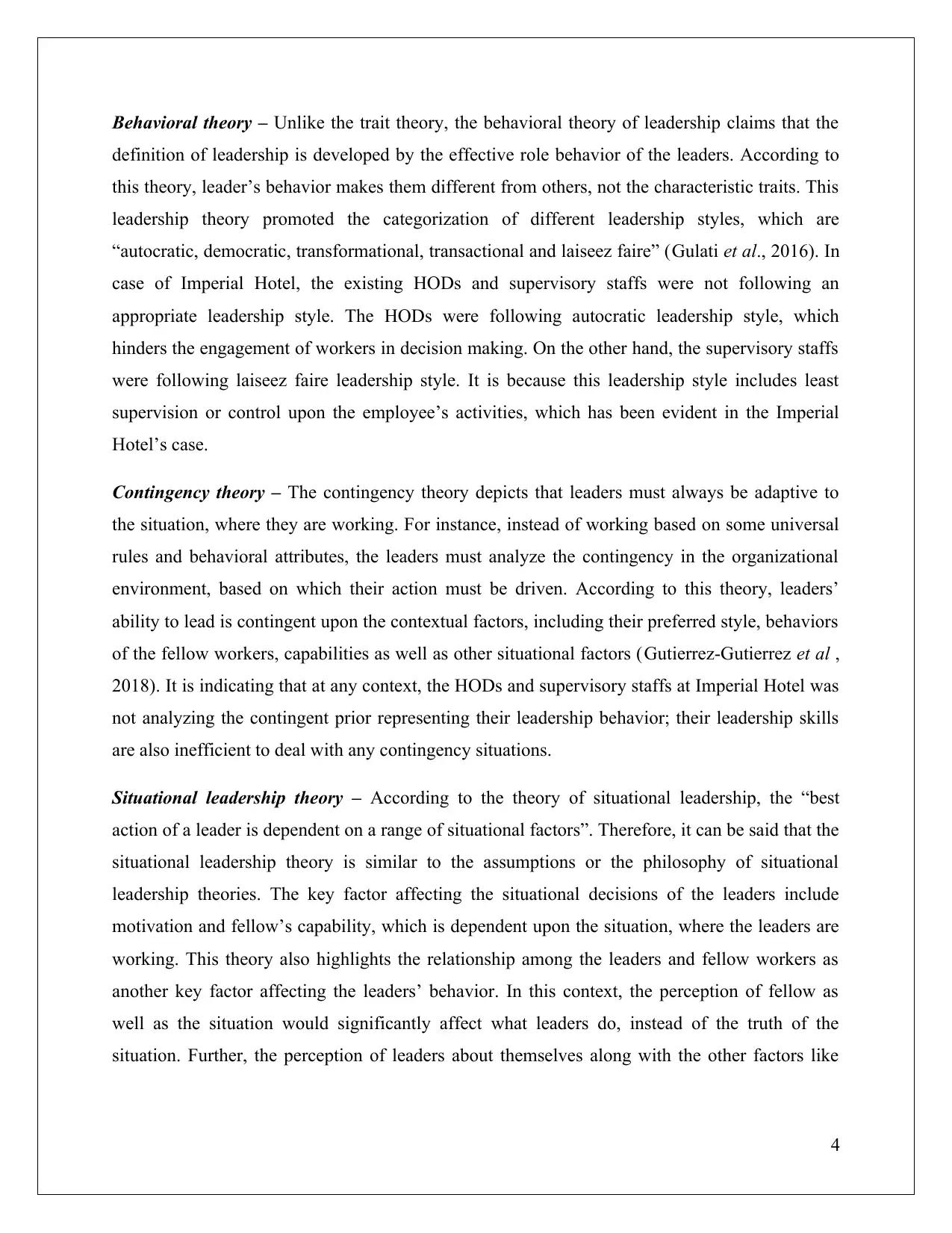
Behavioral theory – Unlike the trait theory, the behavioral theory of leadership claims that the
definition of leadership is developed by the effective role behavior of the leaders. According to
this theory, leader’s behavior makes them different from others, not the characteristic traits. This
leadership theory promoted the categorization of different leadership styles, which are
“autocratic, democratic, transformational, transactional and laiseez faire” (Gulati et al., 2016). In
case of Imperial Hotel, the existing HODs and supervisory staffs were not following an
appropriate leadership style. The HODs were following autocratic leadership style, which
hinders the engagement of workers in decision making. On the other hand, the supervisory staffs
were following laiseez faire leadership style. It is because this leadership style includes least
supervision or control upon the employee’s activities, which has been evident in the Imperial
Hotel’s case.
Contingency theory – The contingency theory depicts that leaders must always be adaptive to
the situation, where they are working. For instance, instead of working based on some universal
rules and behavioral attributes, the leaders must analyze the contingency in the organizational
environment, based on which their action must be driven. According to this theory, leaders’
ability to lead is contingent upon the contextual factors, including their preferred style, behaviors
of the fellow workers, capabilities as well as other situational factors (Gutierrez-Gutierrez et al ,
2018). It is indicating that at any context, the HODs and supervisory staffs at Imperial Hotel was
not analyzing the contingent prior representing their leadership behavior; their leadership skills
are also inefficient to deal with any contingency situations.
Situational leadership theory – According to the theory of situational leadership, the “best
action of a leader is dependent on a range of situational factors”. Therefore, it can be said that the
situational leadership theory is similar to the assumptions or the philosophy of situational
leadership theories. The key factor affecting the situational decisions of the leaders include
motivation and fellow’s capability, which is dependent upon the situation, where the leaders are
working. This theory also highlights the relationship among the leaders and fellow workers as
another key factor affecting the leaders’ behavior. In this context, the perception of fellow as
well as the situation would significantly affect what leaders do, instead of the truth of the
situation. Further, the perception of leaders about themselves along with the other factors like
4
definition of leadership is developed by the effective role behavior of the leaders. According to
this theory, leader’s behavior makes them different from others, not the characteristic traits. This
leadership theory promoted the categorization of different leadership styles, which are
“autocratic, democratic, transformational, transactional and laiseez faire” (Gulati et al., 2016). In
case of Imperial Hotel, the existing HODs and supervisory staffs were not following an
appropriate leadership style. The HODs were following autocratic leadership style, which
hinders the engagement of workers in decision making. On the other hand, the supervisory staffs
were following laiseez faire leadership style. It is because this leadership style includes least
supervision or control upon the employee’s activities, which has been evident in the Imperial
Hotel’s case.
Contingency theory – The contingency theory depicts that leaders must always be adaptive to
the situation, where they are working. For instance, instead of working based on some universal
rules and behavioral attributes, the leaders must analyze the contingency in the organizational
environment, based on which their action must be driven. According to this theory, leaders’
ability to lead is contingent upon the contextual factors, including their preferred style, behaviors
of the fellow workers, capabilities as well as other situational factors (Gutierrez-Gutierrez et al ,
2018). It is indicating that at any context, the HODs and supervisory staffs at Imperial Hotel was
not analyzing the contingent prior representing their leadership behavior; their leadership skills
are also inefficient to deal with any contingency situations.
Situational leadership theory – According to the theory of situational leadership, the “best
action of a leader is dependent on a range of situational factors”. Therefore, it can be said that the
situational leadership theory is similar to the assumptions or the philosophy of situational
leadership theories. The key factor affecting the situational decisions of the leaders include
motivation and fellow’s capability, which is dependent upon the situation, where the leaders are
working. This theory also highlights the relationship among the leaders and fellow workers as
another key factor affecting the leaders’ behavior. In this context, the perception of fellow as
well as the situation would significantly affect what leaders do, instead of the truth of the
situation. Further, the perception of leaders about themselves along with the other factors like
4
Paraphrase This Document
Need a fresh take? Get an instant paraphrase of this document with our AI Paraphraser
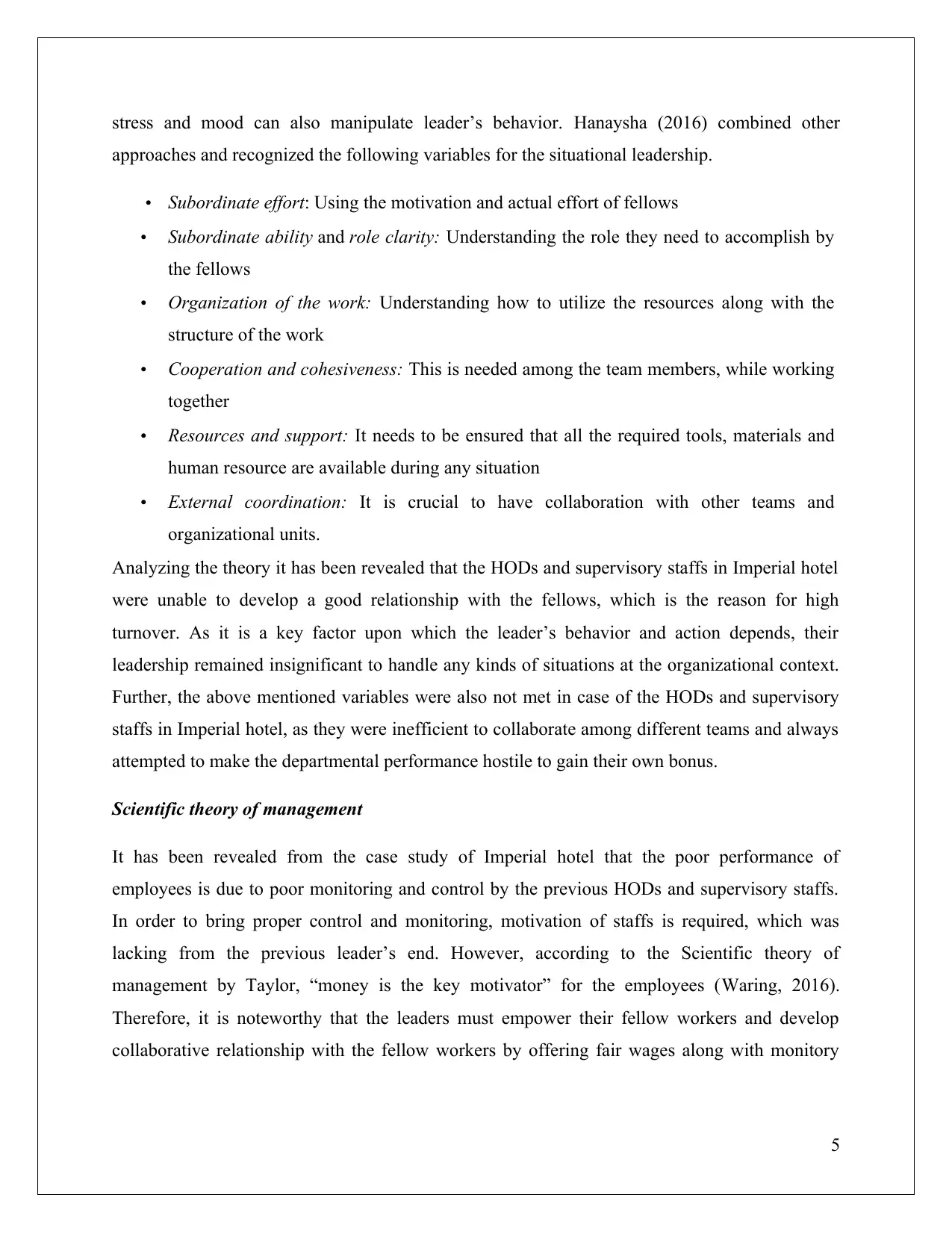
stress and mood can also manipulate leader’s behavior. Hanaysha (2016) combined other
approaches and recognized the following variables for the situational leadership.
Subordinate effort: Using the motivation and actual effort of fellows
Subordinate ability and role clarity: Understanding the role they need to accomplish by
the fellows
Organization of the work: Understanding how to utilize the resources along with the
structure of the work
Cooperation and cohesiveness: This is needed among the team members, while working
together
Resources and support: It needs to be ensured that all the required tools, materials and
human resource are available during any situation
External coordination: It is crucial to have collaboration with other teams and
organizational units.
Analyzing the theory it has been revealed that the HODs and supervisory staffs in Imperial hotel
were unable to develop a good relationship with the fellows, which is the reason for high
turnover. As it is a key factor upon which the leader’s behavior and action depends, their
leadership remained insignificant to handle any kinds of situations at the organizational context.
Further, the above mentioned variables were also not met in case of the HODs and supervisory
staffs in Imperial hotel, as they were inefficient to collaborate among different teams and always
attempted to make the departmental performance hostile to gain their own bonus.
Scientific theory of management
It has been revealed from the case study of Imperial hotel that the poor performance of
employees is due to poor monitoring and control by the previous HODs and supervisory staffs.
In order to bring proper control and monitoring, motivation of staffs is required, which was
lacking from the previous leader’s end. However, according to the Scientific theory of
management by Taylor, “money is the key motivator” for the employees (Waring, 2016).
Therefore, it is noteworthy that the leaders must empower their fellow workers and develop
collaborative relationship with the fellow workers by offering fair wages along with monitory
5
approaches and recognized the following variables for the situational leadership.
Subordinate effort: Using the motivation and actual effort of fellows
Subordinate ability and role clarity: Understanding the role they need to accomplish by
the fellows
Organization of the work: Understanding how to utilize the resources along with the
structure of the work
Cooperation and cohesiveness: This is needed among the team members, while working
together
Resources and support: It needs to be ensured that all the required tools, materials and
human resource are available during any situation
External coordination: It is crucial to have collaboration with other teams and
organizational units.
Analyzing the theory it has been revealed that the HODs and supervisory staffs in Imperial hotel
were unable to develop a good relationship with the fellows, which is the reason for high
turnover. As it is a key factor upon which the leader’s behavior and action depends, their
leadership remained insignificant to handle any kinds of situations at the organizational context.
Further, the above mentioned variables were also not met in case of the HODs and supervisory
staffs in Imperial hotel, as they were inefficient to collaborate among different teams and always
attempted to make the departmental performance hostile to gain their own bonus.
Scientific theory of management
It has been revealed from the case study of Imperial hotel that the poor performance of
employees is due to poor monitoring and control by the previous HODs and supervisory staffs.
In order to bring proper control and monitoring, motivation of staffs is required, which was
lacking from the previous leader’s end. However, according to the Scientific theory of
management by Taylor, “money is the key motivator” for the employees (Waring, 2016).
Therefore, it is noteworthy that the leaders must empower their fellow workers and develop
collaborative relationship with the fellow workers by offering fair wages along with monitory
5
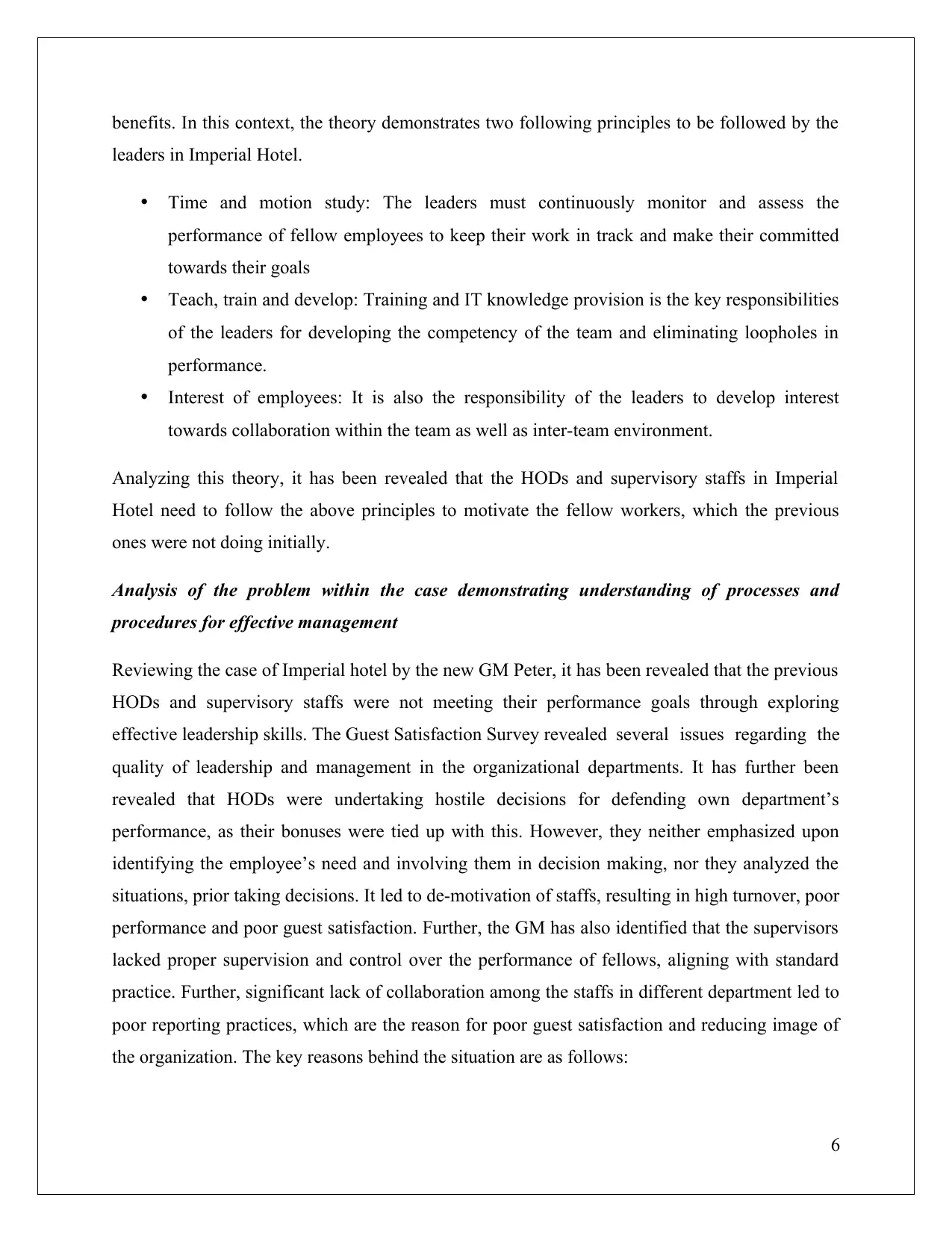
benefits. In this context, the theory demonstrates two following principles to be followed by the
leaders in Imperial Hotel.
Time and motion study: The leaders must continuously monitor and assess the
performance of fellow employees to keep their work in track and make their committed
towards their goals
Teach, train and develop: Training and IT knowledge provision is the key responsibilities
of the leaders for developing the competency of the team and eliminating loopholes in
performance.
Interest of employees: It is also the responsibility of the leaders to develop interest
towards collaboration within the team as well as inter-team environment.
Analyzing this theory, it has been revealed that the HODs and supervisory staffs in Imperial
Hotel need to follow the above principles to motivate the fellow workers, which the previous
ones were not doing initially.
Analysis of the problem within the case demonstrating understanding of processes and
procedures for effective management
Reviewing the case of Imperial hotel by the new GM Peter, it has been revealed that the previous
HODs and supervisory staffs were not meeting their performance goals through exploring
effective leadership skills. The Guest Satisfaction Survey revealed several issues regarding the
quality of leadership and management in the organizational departments. It has further been
revealed that HODs were undertaking hostile decisions for defending own department’s
performance, as their bonuses were tied up with this. However, they neither emphasized upon
identifying the employee’s need and involving them in decision making, nor they analyzed the
situations, prior taking decisions. It led to de-motivation of staffs, resulting in high turnover, poor
performance and poor guest satisfaction. Further, the GM has also identified that the supervisors
lacked proper supervision and control over the performance of fellows, aligning with standard
practice. Further, significant lack of collaboration among the staffs in different department led to
poor reporting practices, which are the reason for poor guest satisfaction and reducing image of
the organization. The key reasons behind the situation are as follows:
6
leaders in Imperial Hotel.
Time and motion study: The leaders must continuously monitor and assess the
performance of fellow employees to keep their work in track and make their committed
towards their goals
Teach, train and develop: Training and IT knowledge provision is the key responsibilities
of the leaders for developing the competency of the team and eliminating loopholes in
performance.
Interest of employees: It is also the responsibility of the leaders to develop interest
towards collaboration within the team as well as inter-team environment.
Analyzing this theory, it has been revealed that the HODs and supervisory staffs in Imperial
Hotel need to follow the above principles to motivate the fellow workers, which the previous
ones were not doing initially.
Analysis of the problem within the case demonstrating understanding of processes and
procedures for effective management
Reviewing the case of Imperial hotel by the new GM Peter, it has been revealed that the previous
HODs and supervisory staffs were not meeting their performance goals through exploring
effective leadership skills. The Guest Satisfaction Survey revealed several issues regarding the
quality of leadership and management in the organizational departments. It has further been
revealed that HODs were undertaking hostile decisions for defending own department’s
performance, as their bonuses were tied up with this. However, they neither emphasized upon
identifying the employee’s need and involving them in decision making, nor they analyzed the
situations, prior taking decisions. It led to de-motivation of staffs, resulting in high turnover, poor
performance and poor guest satisfaction. Further, the GM has also identified that the supervisors
lacked proper supervision and control over the performance of fellows, aligning with standard
practice. Further, significant lack of collaboration among the staffs in different department led to
poor reporting practices, which are the reason for poor guest satisfaction and reducing image of
the organization. The key reasons behind the situation are as follows:
6
⊘ This is a preview!⊘
Do you want full access?
Subscribe today to unlock all pages.

Trusted by 1+ million students worldwide
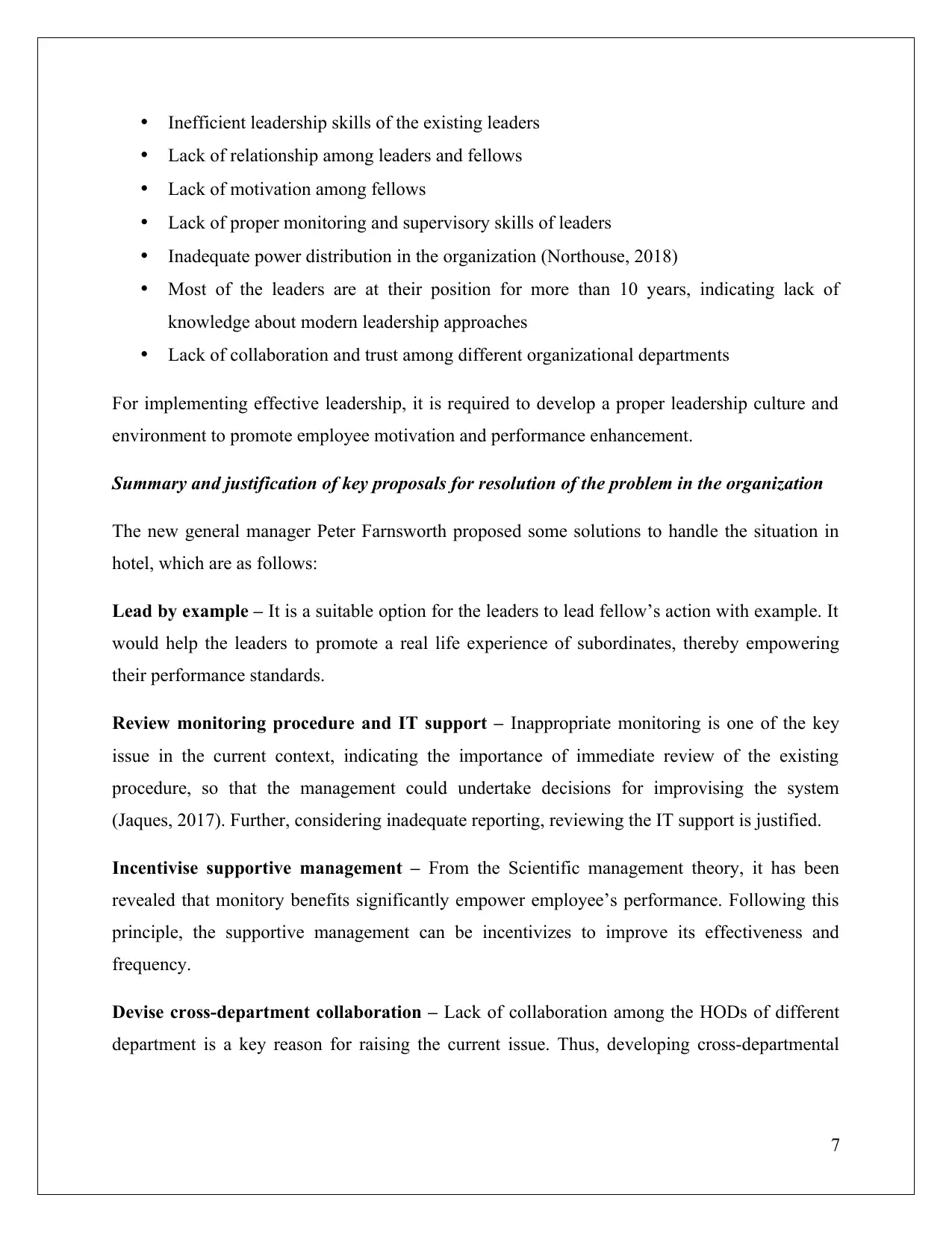
Inefficient leadership skills of the existing leaders
Lack of relationship among leaders and fellows
Lack of motivation among fellows
Lack of proper monitoring and supervisory skills of leaders
Inadequate power distribution in the organization (Northouse, 2018)
Most of the leaders are at their position for more than 10 years, indicating lack of
knowledge about modern leadership approaches
Lack of collaboration and trust among different organizational departments
For implementing effective leadership, it is required to develop a proper leadership culture and
environment to promote employee motivation and performance enhancement.
Summary and justification of key proposals for resolution of the problem in the organization
The new general manager Peter Farnsworth proposed some solutions to handle the situation in
hotel, which are as follows:
Lead by example – It is a suitable option for the leaders to lead fellow’s action with example. It
would help the leaders to promote a real life experience of subordinates, thereby empowering
their performance standards.
Review monitoring procedure and IT support – Inappropriate monitoring is one of the key
issue in the current context, indicating the importance of immediate review of the existing
procedure, so that the management could undertake decisions for improvising the system
(Jaques, 2017). Further, considering inadequate reporting, reviewing the IT support is justified.
Incentivise supportive management – From the Scientific management theory, it has been
revealed that monitory benefits significantly empower employee’s performance. Following this
principle, the supportive management can be incentivizes to improve its effectiveness and
frequency.
Devise cross-department collaboration – Lack of collaboration among the HODs of different
department is a key reason for raising the current issue. Thus, developing cross-departmental
7
Lack of relationship among leaders and fellows
Lack of motivation among fellows
Lack of proper monitoring and supervisory skills of leaders
Inadequate power distribution in the organization (Northouse, 2018)
Most of the leaders are at their position for more than 10 years, indicating lack of
knowledge about modern leadership approaches
Lack of collaboration and trust among different organizational departments
For implementing effective leadership, it is required to develop a proper leadership culture and
environment to promote employee motivation and performance enhancement.
Summary and justification of key proposals for resolution of the problem in the organization
The new general manager Peter Farnsworth proposed some solutions to handle the situation in
hotel, which are as follows:
Lead by example – It is a suitable option for the leaders to lead fellow’s action with example. It
would help the leaders to promote a real life experience of subordinates, thereby empowering
their performance standards.
Review monitoring procedure and IT support – Inappropriate monitoring is one of the key
issue in the current context, indicating the importance of immediate review of the existing
procedure, so that the management could undertake decisions for improvising the system
(Jaques, 2017). Further, considering inadequate reporting, reviewing the IT support is justified.
Incentivise supportive management – From the Scientific management theory, it has been
revealed that monitory benefits significantly empower employee’s performance. Following this
principle, the supportive management can be incentivizes to improve its effectiveness and
frequency.
Devise cross-department collaboration – Lack of collaboration among the HODs of different
department is a key reason for raising the current issue. Thus, developing cross-departmental
7
Paraphrase This Document
Need a fresh take? Get an instant paraphrase of this document with our AI Paraphraser
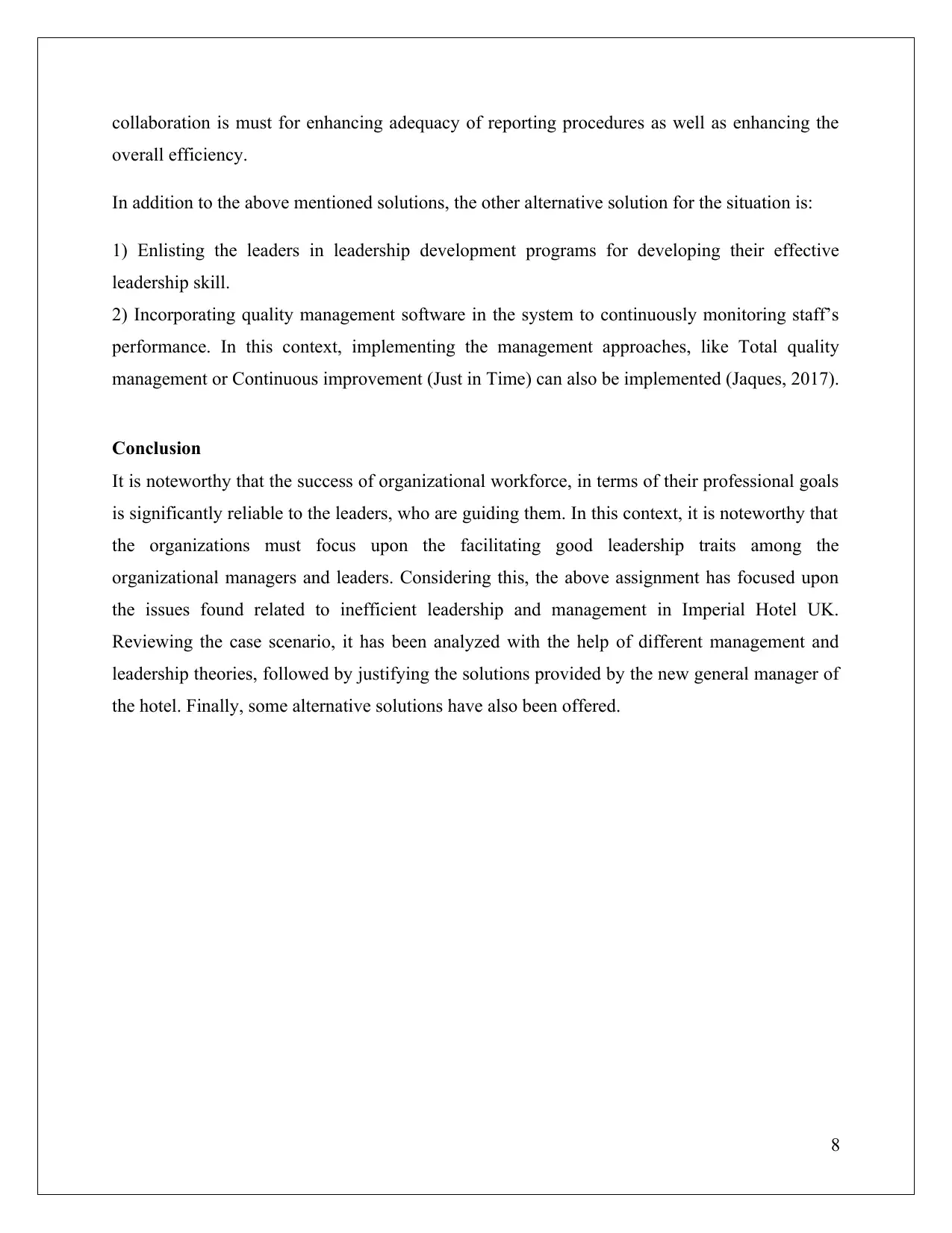
collaboration is must for enhancing adequacy of reporting procedures as well as enhancing the
overall efficiency.
In addition to the above mentioned solutions, the other alternative solution for the situation is:
1) Enlisting the leaders in leadership development programs for developing their effective
leadership skill.
2) Incorporating quality management software in the system to continuously monitoring staff’s
performance. In this context, implementing the management approaches, like Total quality
management or Continuous improvement (Just in Time) can also be implemented (Jaques, 2017).
Conclusion
It is noteworthy that the success of organizational workforce, in terms of their professional goals
is significantly reliable to the leaders, who are guiding them. In this context, it is noteworthy that
the organizations must focus upon the facilitating good leadership traits among the
organizational managers and leaders. Considering this, the above assignment has focused upon
the issues found related to inefficient leadership and management in Imperial Hotel UK.
Reviewing the case scenario, it has been analyzed with the help of different management and
leadership theories, followed by justifying the solutions provided by the new general manager of
the hotel. Finally, some alternative solutions have also been offered.
8
overall efficiency.
In addition to the above mentioned solutions, the other alternative solution for the situation is:
1) Enlisting the leaders in leadership development programs for developing their effective
leadership skill.
2) Incorporating quality management software in the system to continuously monitoring staff’s
performance. In this context, implementing the management approaches, like Total quality
management or Continuous improvement (Just in Time) can also be implemented (Jaques, 2017).
Conclusion
It is noteworthy that the success of organizational workforce, in terms of their professional goals
is significantly reliable to the leaders, who are guiding them. In this context, it is noteworthy that
the organizations must focus upon the facilitating good leadership traits among the
organizational managers and leaders. Considering this, the above assignment has focused upon
the issues found related to inefficient leadership and management in Imperial Hotel UK.
Reviewing the case scenario, it has been analyzed with the help of different management and
leadership theories, followed by justifying the solutions provided by the new general manager of
the hotel. Finally, some alternative solutions have also been offered.
8
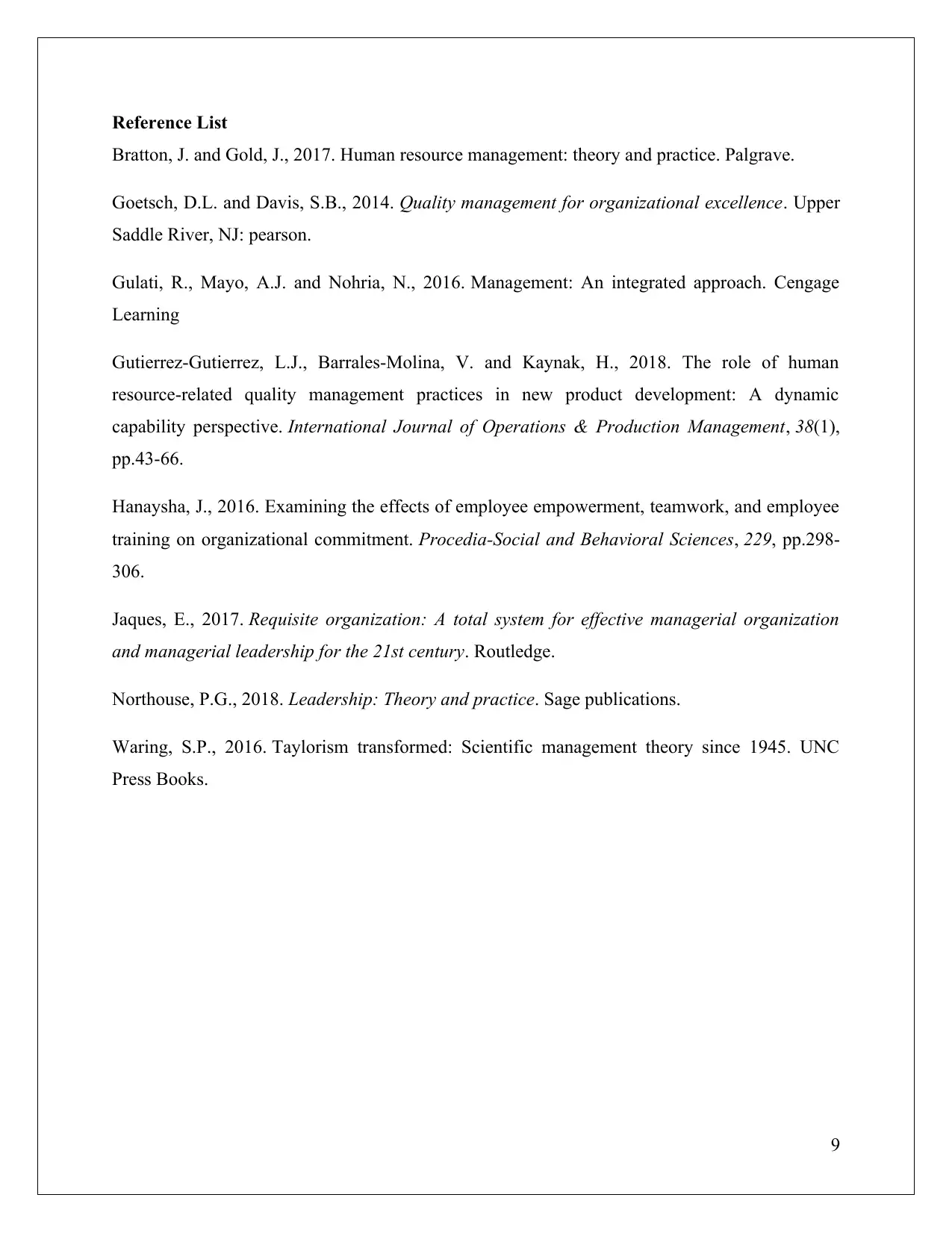
Reference List
Bratton, J. and Gold, J., 2017. Human resource management: theory and practice. Palgrave.
Goetsch, D.L. and Davis, S.B., 2014. Quality management for organizational excellence. Upper
Saddle River, NJ: pearson.
Gulati, R., Mayo, A.J. and Nohria, N., 2016. Management: An integrated approach. Cengage
Learning
Gutierrez-Gutierrez, L.J., Barrales-Molina, V. and Kaynak, H., 2018. The role of human
resource-related quality management practices in new product development: A dynamic
capability perspective. International Journal of Operations & Production Management, 38(1),
pp.43-66.
Hanaysha, J., 2016. Examining the effects of employee empowerment, teamwork, and employee
training on organizational commitment. Procedia-Social and Behavioral Sciences, 229, pp.298-
306.
Jaques, E., 2017. Requisite organization: A total system for effective managerial organization
and managerial leadership for the 21st century. Routledge.
Northouse, P.G., 2018. Leadership: Theory and practice. Sage publications.
Waring, S.P., 2016. Taylorism transformed: Scientific management theory since 1945. UNC
Press Books.
9
Bratton, J. and Gold, J., 2017. Human resource management: theory and practice. Palgrave.
Goetsch, D.L. and Davis, S.B., 2014. Quality management for organizational excellence. Upper
Saddle River, NJ: pearson.
Gulati, R., Mayo, A.J. and Nohria, N., 2016. Management: An integrated approach. Cengage
Learning
Gutierrez-Gutierrez, L.J., Barrales-Molina, V. and Kaynak, H., 2018. The role of human
resource-related quality management practices in new product development: A dynamic
capability perspective. International Journal of Operations & Production Management, 38(1),
pp.43-66.
Hanaysha, J., 2016. Examining the effects of employee empowerment, teamwork, and employee
training on organizational commitment. Procedia-Social and Behavioral Sciences, 229, pp.298-
306.
Jaques, E., 2017. Requisite organization: A total system for effective managerial organization
and managerial leadership for the 21st century. Routledge.
Northouse, P.G., 2018. Leadership: Theory and practice. Sage publications.
Waring, S.P., 2016. Taylorism transformed: Scientific management theory since 1945. UNC
Press Books.
9
⊘ This is a preview!⊘
Do you want full access?
Subscribe today to unlock all pages.

Trusted by 1+ million students worldwide
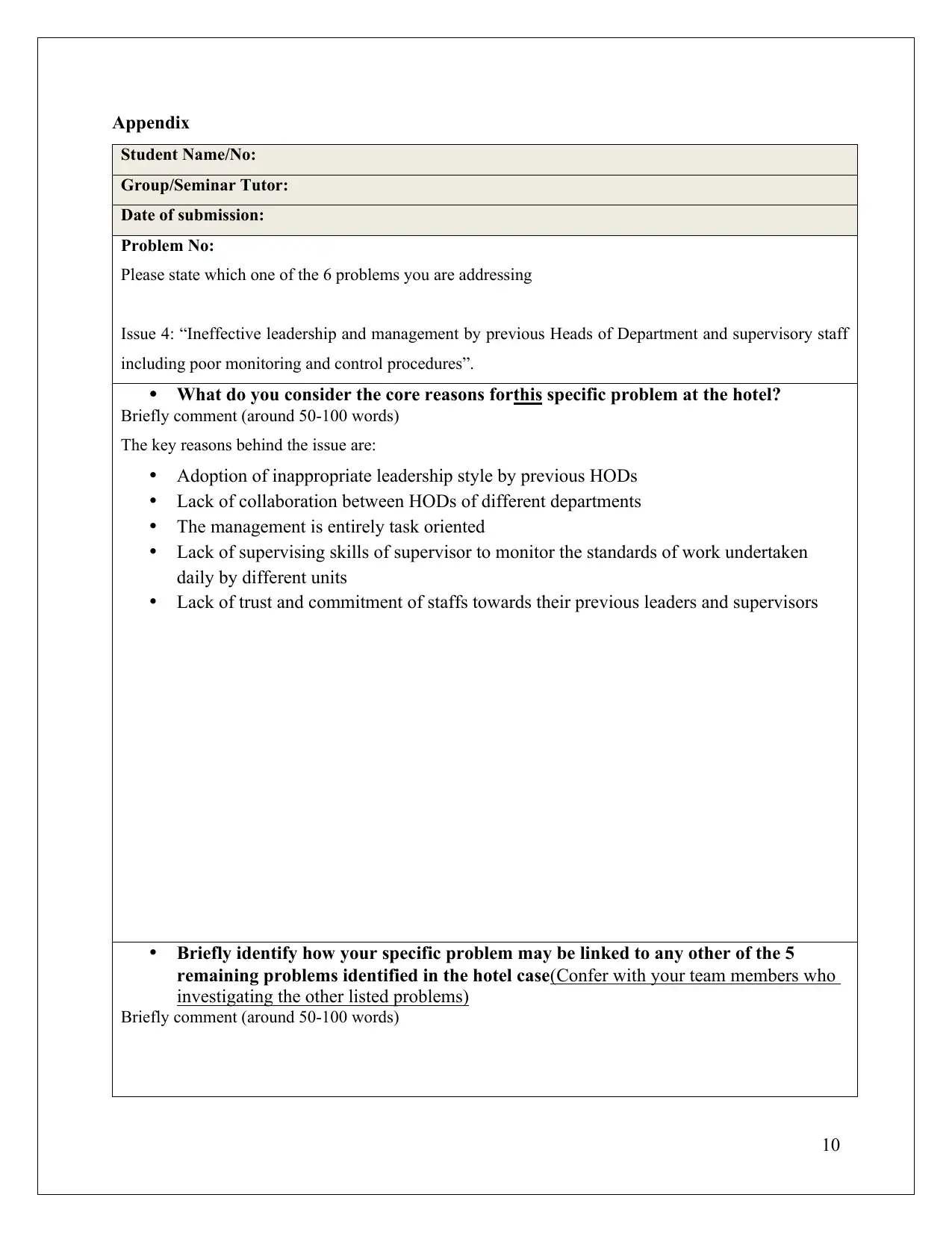
Appendix
Student Name/No:
Group/Seminar Tutor:
Date of submission:
Problem No:
Please state which one of the 6 problems you are addressing
Issue 4: “Ineffective leadership and management by previous Heads of Department and supervisory staff
including poor monitoring and control procedures”.
What do you consider the core reasons forthis specific problem at the hotel?
Briefly comment (around 50-100 words)
The key reasons behind the issue are:
Adoption of inappropriate leadership style by previous HODs
Lack of collaboration between HODs of different departments
The management is entirely task oriented
Lack of supervising skills of supervisor to monitor the standards of work undertaken
daily by different units
Lack of trust and commitment of staffs towards their previous leaders and supervisors
Briefly identify how your specific problem may be linked to any other of the 5
remaining problems identified in the hotel case(Confer with your team members who
investigating the other listed problems)
Briefly comment (around 50-100 words)
10
Student Name/No:
Group/Seminar Tutor:
Date of submission:
Problem No:
Please state which one of the 6 problems you are addressing
Issue 4: “Ineffective leadership and management by previous Heads of Department and supervisory staff
including poor monitoring and control procedures”.
What do you consider the core reasons forthis specific problem at the hotel?
Briefly comment (around 50-100 words)
The key reasons behind the issue are:
Adoption of inappropriate leadership style by previous HODs
Lack of collaboration between HODs of different departments
The management is entirely task oriented
Lack of supervising skills of supervisor to monitor the standards of work undertaken
daily by different units
Lack of trust and commitment of staffs towards their previous leaders and supervisors
Briefly identify how your specific problem may be linked to any other of the 5
remaining problems identified in the hotel case(Confer with your team members who
investigating the other listed problems)
Briefly comment (around 50-100 words)
10
Paraphrase This Document
Need a fresh take? Get an instant paraphrase of this document with our AI Paraphraser
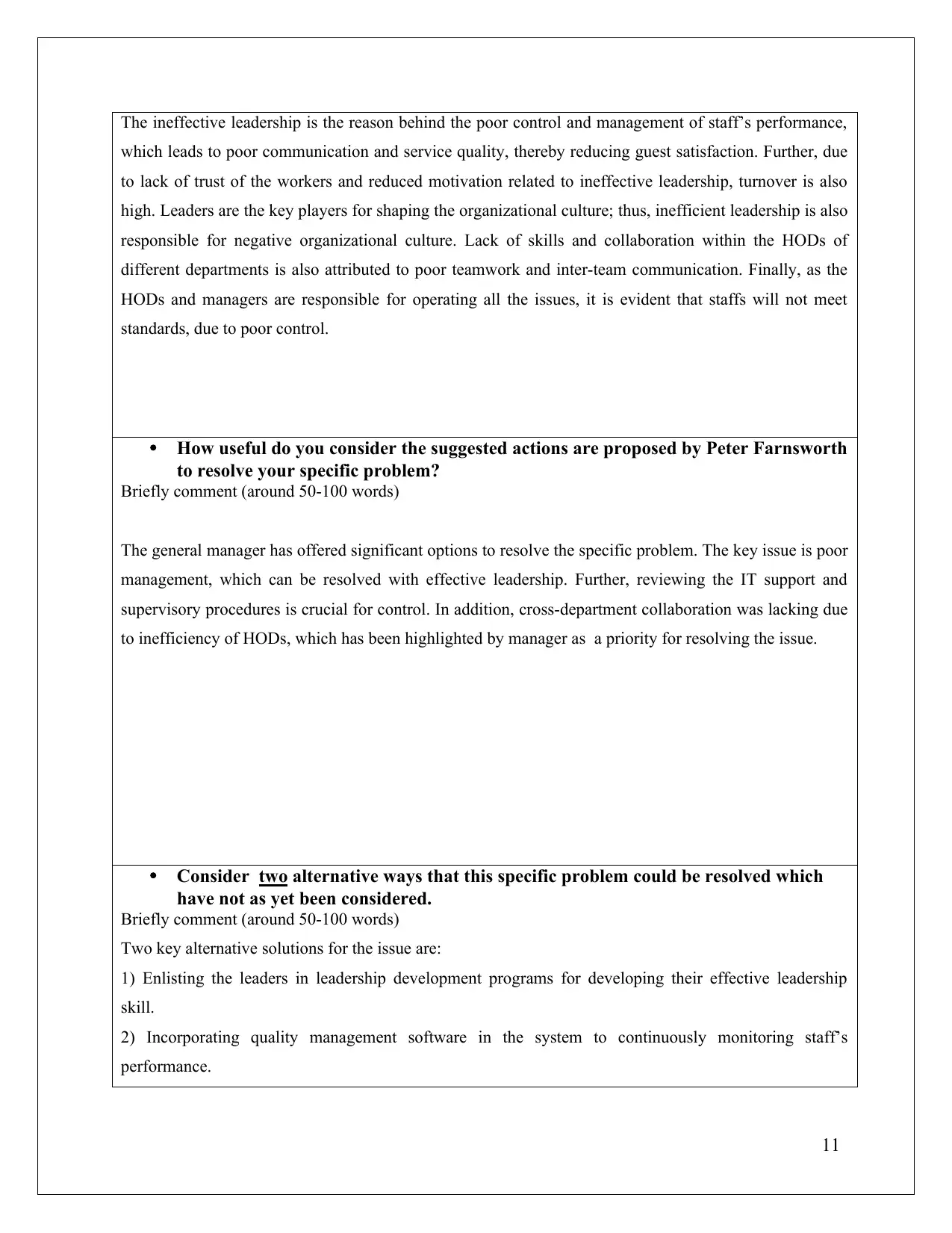
The ineffective leadership is the reason behind the poor control and management of staff’s performance,
which leads to poor communication and service quality, thereby reducing guest satisfaction. Further, due
to lack of trust of the workers and reduced motivation related to ineffective leadership, turnover is also
high. Leaders are the key players for shaping the organizational culture; thus, inefficient leadership is also
responsible for negative organizational culture. Lack of skills and collaboration within the HODs of
different departments is also attributed to poor teamwork and inter-team communication. Finally, as the
HODs and managers are responsible for operating all the issues, it is evident that staffs will not meet
standards, due to poor control.
How useful do you consider the suggested actions are proposed by Peter Farnsworth
to resolve your specific problem?
Briefly comment (around 50-100 words)
The general manager has offered significant options to resolve the specific problem. The key issue is poor
management, which can be resolved with effective leadership. Further, reviewing the IT support and
supervisory procedures is crucial for control. In addition, cross-department collaboration was lacking due
to inefficiency of HODs, which has been highlighted by manager as a priority for resolving the issue.
Consider two alternative ways that this specific problem could be resolved which
have not as yet been considered.
Briefly comment (around 50-100 words)
Two key alternative solutions for the issue are:
1) Enlisting the leaders in leadership development programs for developing their effective leadership
skill.
2) Incorporating quality management software in the system to continuously monitoring staff’s
performance.
11
which leads to poor communication and service quality, thereby reducing guest satisfaction. Further, due
to lack of trust of the workers and reduced motivation related to ineffective leadership, turnover is also
high. Leaders are the key players for shaping the organizational culture; thus, inefficient leadership is also
responsible for negative organizational culture. Lack of skills and collaboration within the HODs of
different departments is also attributed to poor teamwork and inter-team communication. Finally, as the
HODs and managers are responsible for operating all the issues, it is evident that staffs will not meet
standards, due to poor control.
How useful do you consider the suggested actions are proposed by Peter Farnsworth
to resolve your specific problem?
Briefly comment (around 50-100 words)
The general manager has offered significant options to resolve the specific problem. The key issue is poor
management, which can be resolved with effective leadership. Further, reviewing the IT support and
supervisory procedures is crucial for control. In addition, cross-department collaboration was lacking due
to inefficiency of HODs, which has been highlighted by manager as a priority for resolving the issue.
Consider two alternative ways that this specific problem could be resolved which
have not as yet been considered.
Briefly comment (around 50-100 words)
Two key alternative solutions for the issue are:
1) Enlisting the leaders in leadership development programs for developing their effective leadership
skill.
2) Incorporating quality management software in the system to continuously monitoring staff’s
performance.
11
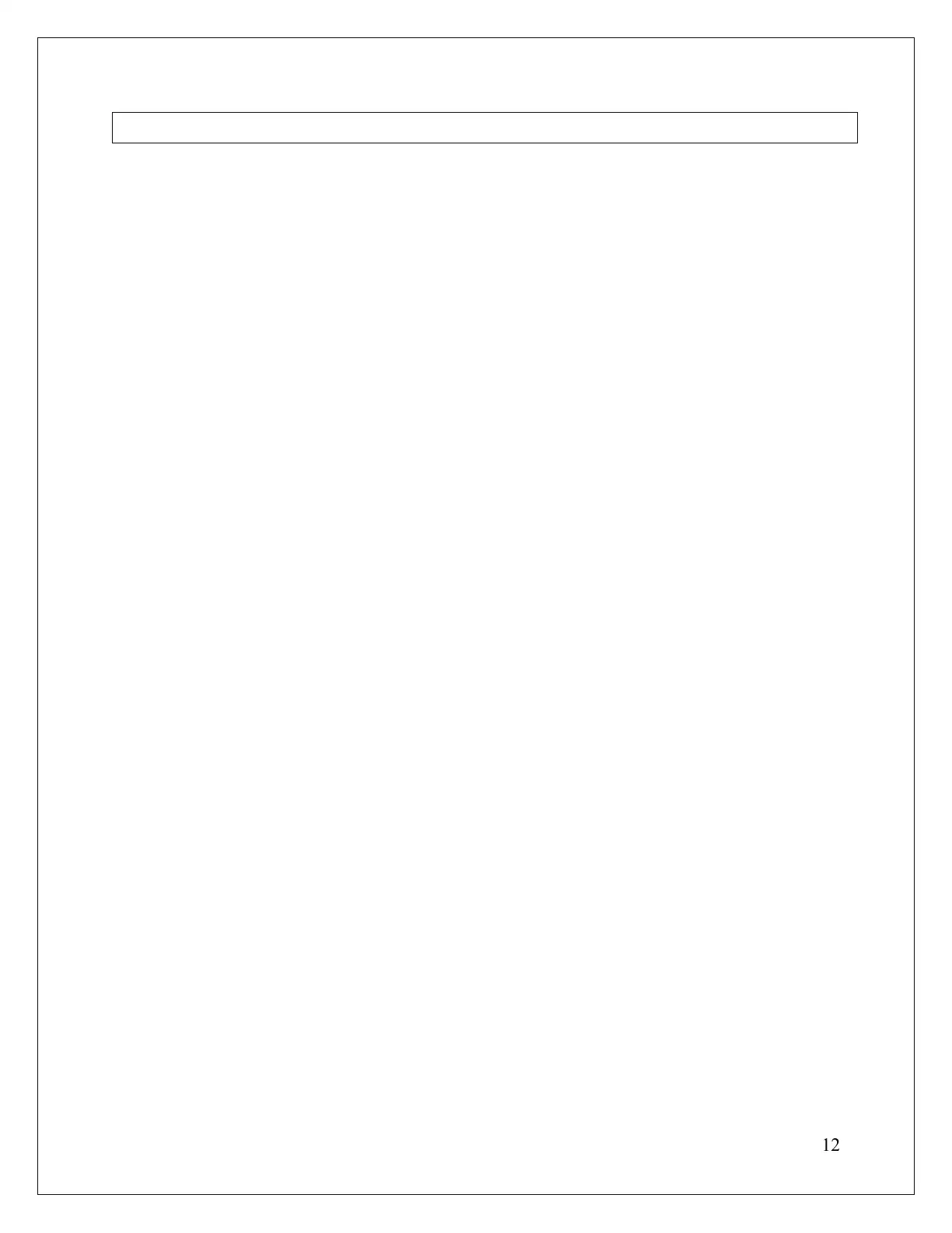
12
⊘ This is a preview!⊘
Do you want full access?
Subscribe today to unlock all pages.

Trusted by 1+ million students worldwide
1 out of 12
Related Documents
Your All-in-One AI-Powered Toolkit for Academic Success.
+13062052269
info@desklib.com
Available 24*7 on WhatsApp / Email
![[object Object]](/_next/static/media/star-bottom.7253800d.svg)
Unlock your academic potential
Copyright © 2020–2026 A2Z Services. All Rights Reserved. Developed and managed by ZUCOL.





